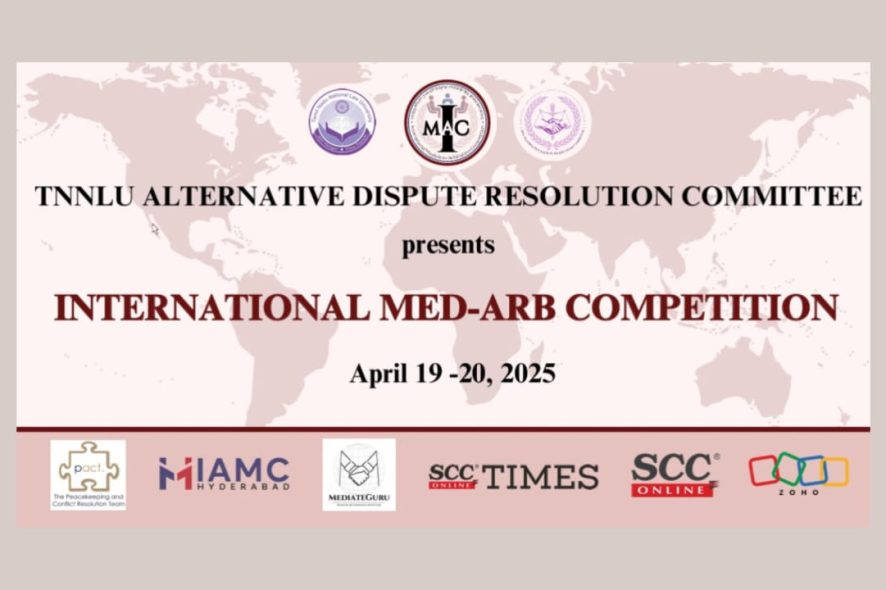Welcome to the Temple City of Tamil Nadu, Tiruchirappalli!
The Alternative Dispute Resolution Committee (ADRC) at Tamil Nadu National Law University (TNNLU) was established in 2018 to serve as a comprehensive platform for introducing law students to the dynamic and evolving field of Alternative Dispute Resolution (ADR). Rooted in a vision to prepare students for the modern landscape of dispute resolution, where ADR mechanisms are gaining increasing prominence, the ADRC has consistently strived to equip budding legal minds with essential skills and insights. Since its inception, the committee has successfully organized numerous workshops and intra-university ADR competitions. One of its most notable achievements has been hosting six editions of its flagship event, the TNNLU National Med-Arb Competition (NMAC), which has garnered participation from prestigious law schools across India.
The TNNLU National Med-Arb Competition (NMAC) stands out as a unique platform that challenges participants to showcase their skills in both mediation and arbitration. Over the years, the competition has featured diverse themes including medical negligence, insurance disputes, corporate and contractual disagreements, and joint development agreements. NMAC is renowned for its panel of expert adjudicators, who bring a wealth of experience and uphold the highest standards of fairness, impartiality, and ADR expertise throughout the competition.
Building on the success of NMAC, the ADRC is proud to announce the Inaugural Edition of the International Med-Arb Competition (IMAC), designed to offer an even broader platform for aspiring dispute resolution professionals from around the world. Med-Arb, a hybrid process that combines the collaborative approach of mediation with the finality and structure of arbitration, is at the heart of this competition. IMAC aims to provide participants with a comprehensive understanding of this innovative mechanism, preparing them for real-world dispute resolution challenges.
The competition includes two distinct stages—Mediation and Arbitration—in every round. Participants representing the role of Client-Counsel in the Mediation Rounds transition into Counsels for the Arbitration Rounds, while those acting as Mediators take on the role of Arbitrators in the Arbitration phase. Following each online Preliminary Round, participants reprising the Mediator/Arbitrator role will be required to draft an Arbitral Award. These Preliminary Rounds will be conducted online to ensure accessibility for teams worldwide.
This year’s problem centers on a contractual dispute between BrightLeaf Enterprises Pvt. Ltd. and CafeBliss International LLC, arising from their Master Franchise Agreement (MFA). Key issues include CafeBliss’s unilateral increase in royalty fees, the establishment of “CafeBliss Lite” outlets within BrightLeaf’s exclusive territory, and the franchisor’s alliances with third-party delivery services, all of which BrightLeaf alleges breach the MFA. Conversely, CafeBliss contends that BrightLeaf’s unauthorized menu modifications and procurement of local substitutes violate brand guidelines. The dispute has progressed through mediation and is now in arbitration, focusing on the validity of the royalty increase, territorial exclusivity, compliance with operational standards, and claims for compensation by both parties.
From the 20 teams participating in the Preliminary Rounds, the top 12 teams qualified for the offline Advanced Rounds, which include a Qualifier Round, Semi-Finals, and Finals. Through IMAC, the ADRC reaffirms its dedication to promoting ADR and nurturing the next generation of dispute resolution professionals.
19th April, 2025 (Day 1)-
9:30 AM | Registration | Multi-Purpose Hall
The event opens with a seamless registration process, marking the beginning of an engaging experience for all attendees. As participants arrive, they’re welcomed by the Organizing Committee’s warm smiles and encouraging words, instantly creating a friendly and supportive atmosphere. By the time registration wraps up, it’s clear that a dynamic, diverse gathering of law students from across India has convened, each one energized and ready to make this competition a success.
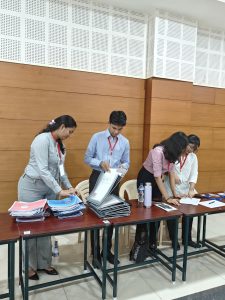
10:15 AM | Inaugratration Ceremony | Multi-Purpose Hall
The inauguration ceremony of IMAC begins with a warm welcome and expressions of gratitude to all present for joining this premier event. Mr. Vashishthan and Ms. Mrinmoyee Mukherjee, the faculty‐in‐charge, are invited onto the stage, and the gathering stands for the singing of “Tamil Thai Vazhthu.” The Convenor and Co‑Convenor then join the dignitaries on the dais, and together they proceed to light the ceremonial lamp, an auspicious start that reflects the ADRC’s pride in hosting IMAC at TNNLU. After recalling the February 16th prelims and congratulating those who have qualified, the Convenor explains the essence of arbitration and formally calls upon Mr. Vashishthan to commence the inaugural proceedings.
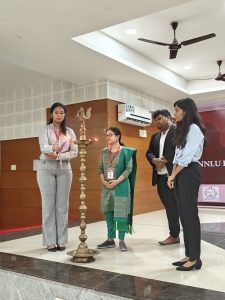
Speaking on behalf of TNNLU and the ADRC, Mr. Vashishthan extends heartfelt congratulations and a warm welcome to every participant, especially those whose negotiation skills and creative flair shone during the prelims. He underscores how Med‑Arb sidesteps adversarial litigation by fostering collaboration: disputes arise not from personal animosity but from circumstances engineered by procedural delays and systemic hurdles. Emphasizing that mediation thrives only on voluntariness and trust, he reminds everyone that once trust is lost, the very foundation of ADR crumbles. Reflecting on India’s tradition of equitable dispute resolution, he praises Indian teams for balancing self‑interest with genuine concern for their counterparts’ welfare.
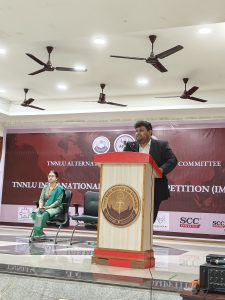
Mr. Vashishthan applauds the ADRC’s bold decision to pioneer the Med‑Arb format in India and to expand IMAC internationally, an initiative made possible by the post‑COVID Zoom era. He celebrates the outstanding turnout, with nearly all teams hailing from India alongside one distinguished international entrant, and commends the participants for embracing this innovative hybrid. Encouraging everyone to think beyond conventional solutions, he reminds them that “smooth seas never made great sailors.” Finally, he thanks the competition’s sponsors for their unwavering support and wishes all teams the very best as they navigate the challenges ahead, confident that this experience will shape them into even stronger dispute resolution professionals.
2:15 PM | Qualifier Rounds | UG Block
Court Hall-I
Med-
The proceedings begin with a warm welcome and introduction of the judges. The mediator opens the session by greeting both BrightLeaf Enterprises Pvt. Ltd. and CafeBliss International LLC, introducing themselves, and affirming their commitment to confidentiality. They then outline the rules and structure of the mediation, emphasizing the need for cooperation, respect, and a constructive atmosphere to guide the parties toward a mutually satisfactory resolution.
Once the framework is clear, BrightLeaf (TC 01) presents its grievances: a unilateral royalty increase imposed by CafeBliss, operational shortcuts, such as the use of cheaper ingredients that compromise quality, and the launch of “Cafe Bliss Lite” outlets in violation of their exclusivity agreement. BrightLeaf offers to concede the southern region of Litoria as part of a settlement but requests written guarantees to ensure clear brand differentiation. They also seek reimbursement for the financial strain caused by Café Bliss’s actions and reaffirm that they never consented to any royalty modification.
CafeBliss counters by denying any breach. They explain that Cafe Bliss Lite targets a different market segment and could boost BrightLeaf’s overall sales. CafeBliss agrees to guarantee brand differentiation and shows flexibility on the royalty issue. Additionally, they highlight the operational support already provided, establishing 30 outlets, and argue that further collaboration will only strengthen BrightLeaf’s business and foster financial growth.
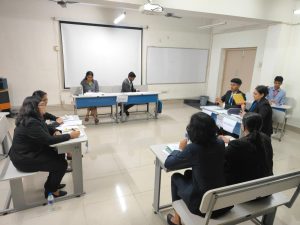
Through guided discussion, the mediators help the parties reach several key compromises: clarifying the lease agreement and operational support terms, exploring BrightLeaf’s rights in the southern Litoria territory, and arriving at a justified 12 percent royalty increase, supported by CafeBliss due to inflationary pressures and global economic trends. The judges commend the mediators for coordinating an open and collaborative dialogue, noting that both counsel and clients engaged meaningfully to narrow their differences.
In their feedback, the judges praise the clear communication and collaborative spirit but advise the mediators to improve time management and to provide more structured summaries throughout the session. They highlight the importance of gap identification and suggest that certain operational support terms be examined more persistently to ensure clarity. Despite these areas for growth, the judges affirm that the session successfully demonstrated the strengths of mediation and set the stage for a promising resolution.
Arb-
The arbitration was presided over by an esteemed tribunal comprising Mr. Richard Colson and Mr. Murali Krishnan. The Tribunal frames four critical issues: the validity of Café Bliss’s unilateral royalty increase under the MFA; whether “Café Bliss Lite” outlets breach exclusivity; whether BrightLeaf’s use of local substitutes and menu changes violates operational requirements; and whether either party must compensate the other for these alleged breaches.
BrightLeaf vigorously contends that Café Bliss breached its exclusivity obligations under Clause 6.1 by launching “Café Bliss Lite,” creating trademark confusion and endangering customer loyalty and brand reputation, invoking the Whirlpool precedent on brand dilution. They argue that operational obligations in Clause 5.2 are interdependent, such that BrightLeaf’s menu adjustments were good‑faith responses to supply disruptions caused by Café Bliss. To justify these regional adaptations, BrightLeaf cites global glocalization practices exemplified by McDonald’s.
In response, Café Bliss justifies the royalty hike as a necessary adjustment to global inflation, citing a 5 percent rate from World Bank data, and argues that BrightLeaf’s continued payment for a year implies consent under commercial contract doctrines. They insist “Café Bliss Lite” is a distinct sub‑brand targeting a separate market segment, complete with unique menus and pricing. Café Bliss also accuses BrightLeaf of breaching brand trust by introducing cheaper alternatives that could undermine the primary brand’s reputation. In their compensation claim, Café Bliss seeks 30 percent of alleged reputational losses, amounting to approximately ₹2.75 crore.
The Tribunal commends both sides for their energy and clarity but offers pointed feedback: counsel must use precise terminology when addressing arbitrators, adhere strictly to the agreed proposition without extraneous facts, and maintain professional composure. They emphasize the need for evidence‑backed arguments and caution against emotional exaggeration. Judges suggest that future sessions would benefit from deeper research, refined time management, and prepared defenses to anticipated counterarguments. The round concludes on a positive note, with praise for its overall structure and encouragement to uphold the highest standards of decorum and legal rigor.
Court Hall-II
Med-
The virtual rounds take place smoothly on Google Meet, with judges, mediators, lawyers, and company representatives all joining right on time. The mediator starts by explaining why mediation can work well—keeping things private, letting the parties make their own choices, and settling disputes faster than a court. They then set the basic ground rules: keep conversations confidential, wait your turn to speak, and treat everyone with respect. To make sure the online format runs without hiccups, the mediator also asks everyone to mute themselves when not speaking, identify themselves before talking, and use the chat feature for quick technical questions.
After the rules are clear, each side presents its main points. The first team compares their contract to a delicate balance that needs both sides to stay true to the agreement. They point out four big concerns: broken promises in the contract, drops in quality, launching a new “Lite” brand despite exclusivity promises, and sudden changes to royalties. The mediator listens to both teams, then decides which issue to tackle first based on what both sides see as most important.
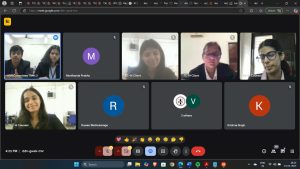
As the discussion moves forward, everyone follows the online etiquette: microphones off when not speaking and a clear label when they do speak, “BrightLeaf counsel” or “CaféBliss representative.” The mediator stays calm and neutral, guiding the conversation, summarizing where the parties agree or disagree, and making sure no one dominates the talk. Even when the teams strongly disagree over menu changes or brand use, they keep their tone polite and stick to the facts.
By the end, it’s clear that the online setting hasn’t slowed anyone down. The mediator wraps up by reviewing the points both sides have agreed on and highlighting what still needs work. The judges compliment everyone on their punctuality, good manners, and focus on real issues. They also praise the mediator for keeping everything on track. In the end, the session is both productive and respectful, showing that even over video call, mediation can be clear, fair, and effective.
Arb-
Both parties joined the Google Meet session promptly, and the arbitrator began by explaining the arbitration process to everyone. Each side was allotted a specific time slot for their presentations, and these time limits were strictly observed throughout the proceeding.
The requesting party opened the session, dividing their submissions into two main issues handled by different counsel. They cited relevant provisions of the Indian Contract Act, 1872, the Competition Act, 2002, and specific clauses from their contract. Their arguments focused on the unilateral increase in royalty fees, the exclusivity clause, the force majeure provision, allegations of abuse of dominance, breaches of other contractual terms, and their claim for compensation.
Once the requesting party concluded, the respondents presented their case. They systematically rebutted each point—challenging the validity of the royalty hike, defending their invocation of the force majeure clause, and disputing any breach of exclusivity or other contractual obligations. The co‑counsel for the respondents wrapped up their submissions by clearly stating their prayers before the tribunal.
Both teams supported their positions with landmark judgments from the Supreme Court and various High Courts. The requesting party delivered concise rebuttals to the respondents’ contentions, maintaining a sharp focus on the legal issues. After the arguments, the judges posed several questions to clarify key points and then provided constructive feedback on each team’s performance.
Throughout the virtual hearing, participants muted their microphones when not speaking and addressed the tribunal with proper courtesy, using phrases like “Your Honour” and “Learned Arbitrator.” The arbitrators maintained a calm, impartial tone, stepping in only to seek clarifications or pose challenging questions. Despite the online format, the session ran smoothly with minimal technical interruptions, and the professionalism of everyone involved preserved the integrity and focus of the arbitration process.
Court Hall-III
Med-
The mediation session commenced at 2:44 PM, with the mediators initiating the proceedings by explaining the mediation process. They emphasized that mediation is a voluntary and collaborative effort aimed at resolving disputes through constructive dialogue, not adversarial confrontation. The mediators highlighted that their role was to facilitate a structured conversation between CaféBliss and BrightLeaf, helping both parties arrive at a mutually agreeable solution. They reiterated the importance of maintaining a respectful tone, setting clear agendas, and working toward a resolution. The process, they clarified, would begin with opening statements, followed by discussions on the key issues, and would conclude with closing remarks.
The session began with the CEO of BrightLeaf presenting the opening statement. He introduced BrightLeaf as a dedicated regional franchisee managing multiple café outlets and thanked the mediators for organizing the session. He encouraged CaféBliss to ask questions at any point and stated that the goal was to reflect on the existing business relationship, explore its future trajectory, and address the exclusivity clause. BrightLeaf highlighted the severe financial strain it faced due to the unexpected royalty hike and operational setbacks caused by CaféBliss’s failure to supply proprietary materials in a timely manner. The CEO justified local menu adaptations as necessary responses to the franchisor’s insufficient regional marketing support and inconsistent supply chain. BrightLeaf demanded a rollback of the royalty hike, compensation for incurred losses, stricter enforcement of exclusivity rights, and more robust operational support from CaféBliss.
In response, CaféBliss acknowledged and thanked the mediators, expressing appreciation for the opportunity to clarify the issues. They began by defending the royalty increase, citing global inflation and rising operating costs. While they apologized for the lack of prior consent, they stated the decision was made after internal consultations and shareholder discussions during the pandemic, asserting that such adjustments were crucial for business sustainability. CaféBliss clarified that the “CaféBliss Lite” outlets launched in Northern India were part of a separate demographic strategy and did not constitute a breach of exclusivity. They also criticized BrightLeaf for deviating from brand standards by introducing unauthorized menu items and using inferior quality coffee, which they claimed harmed the brand’s reputation. CaféBliss requested greater audit oversight and compliance from BrightLeaf to preserve brand integrity.
At this point, the mediators intervened due to time constraints and asked both parties to limit their discussion to the agreed-upon agendas. The specific issues discussed included changes in the menu, the use of low-grade coffee beans, and the opening of “CaféBliss Lite” in Northern India. On the matter of increased royalties, the mediators noted that a 2% hike had already been implemented. CaféBliss explained that raising royalties without prior consent was not ideal, but was driven by pandemic-induced pressures and global inflation. They argued that with only a 10% rate, they would suffer significant financial loss, whereas BrightLeaf, managing several outlets, would remain largely stable. BrightLeaf, however, stressed that any increase should have been mutually decided.
As the session progressed, both parties expressed partial agreement on compensation. A proposal was floated for BrightLeaf to receive reimbursement amounting to 30% of its profits, acknowledging the hardships faced. Due to time limitations, no conclusive resolution was reached, and only one major issue—royalty increase—was fully discussed. Both parties agreed to continue further dialogue in future sessions to address the remaining concerns.
In their closing statements, BrightLeaf was willing to continue the business relationship and appreciated CaféBliss’s cooperative attitude during the session. CaféBliss, in turn, stated that they valued the partnership and welcomed future discussions to resolve outstanding matters. The mediators concluded by emphasizing that mediation is not about finding immediate solutions but about progressing toward mutual understanding. Although the session did not result in a full settlement, it marked a partial success with both parties agreeing on a framework for partial reimbursement and a commitment to future discussions.
Arb-
BrightLeaf, as the claimant, alleged that CaféBliss had violated several key provisions of the Master Franchise Agreement (MFA). Primarily, BrightLeaf contended that CaféBliss breached Clause 4.3 by unilaterally increasing the royalty from 10% to 12% without obtaining the franchisee’s consent. This act, they argued, severely impacted their financial sustainability in a post-pandemic economy. BrightLeaf emphasized that any alteration to the terms of the agreement required mutual consent, and unilateral impositions amounted to a contractual breach. In support of this, BrightLeaf relied on jurisprudence that held parties to a contract must strictly adhere to its terms unless mutually altered, reinforcing that a unilateral change in royalty constitutes a clear violation of the MFA and entitles the aggrieved party to compensation.
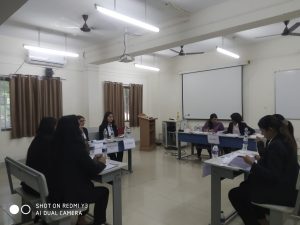
Further, BrightLeaf accused CaféBliss of breaching Clause 6.1 of the MFA by launching “CaféBliss Lite” outlets within BrightLeaf’s exclusive territory. The claimant argued that sub-branding could not override clearly negotiated exclusivity clauses. They also raised concerns about CaféBliss forming partnerships with third-party delivery services that directly competed within their exclusive zone, undermining their market share and clientele. BrightLeaf substantiated their claims by invoking Section 51 of the Indian Contract Act, 1872, on reciprocal promises, asserting that they fulfilled their obligations and expected the franchisor to uphold its end of the bargain.
Additionally, the claimant drew attention to consistent operational defaults by CaféBliss, including delayed supply of proprietary materials, lack of region-specific marketing assistance, and absence of adequate training support. These failures compelled BrightLeaf to adopt local adaptations, including unauthorized menu changes, which were portrayed as survival measures under economic distress. They cited relevant case laws establishing that if a breach arises from the other party’s default, the aggrieved party may be excused from strict performance and is entitled to seek compensation.
On the other side, CaféBliss, as the respondent, categorically denied all allegations. It justified the royalty hike as a necessary response to global inflation and increased operational costs. Referring to Sections 9, 10, and 62 of the Indian Contract Act, CaféBliss argued that contractual performance had become commercially burdensome, and hence adjustments were within the realm of necessity, not breach. They relied on ONGC v. Saw Pipes to assert that where performance is impacted by broader economic conditions, some flexibility in commercial terms is justified, particularly when the original agreement lacks explicit restraints.
Regarding the “CaféBliss Lite” issue, the respondent clarified that it was a separate brand aimed at a different market segment and not in direct competition with the premium CaféBliss model. They cited the distinction between two separate branding strategies and asserted that CaféBliss Lite, being a low-cost model, did not infringe BrightLeaf’s exclusivity under Clause 6.1. They further referenced Section 27 of the Indian Contract Act to argue that agreements in restraint of trade are not to be construed rigidly, and market expansion should not be unfairly curtailed.
On the issue of menu alterations and third-party delivery tie-ups, CaféBliss contended that BrightLeaf’s unauthorized changes and use of inferior substitutes harmed the brand’s goodwill. They invoked Section 39 of the Indian Contract Act, stating that a party’s refusal to adhere to agreed terms without valid cause may discharge the other party from its obligations and entitle them to damages. The respondent also referenced Section 29 of the Trade Marks Act to argue that inconsistent branding and unauthorized changes by BrightLeaf amounted to dilution of trademark value.
Lastly, CaféBliss argued that it had made multiple efforts to train and support BrightLeaf’s staff, and it was BrightLeaf’s operational failures that caused its declining business performance. Without prior approval, the addition of new menu items and poor-quality ingredients misled consumers and affected brand perception. Thus, CaféBliss claimed it was entitled to compensation due to reputational harm and breach of contract by BrightLeaf.
In conclusion, while BrightLeaf alleged multiple breaches of the MFA, CaféBliss maintained that its actions were commercially justified and that BrightLeaf’s own conduct had violated brand standards. Both parties grounded their arguments in statutory provisions and case law, leading to a complex dispute that centered around contract interpretation, exclusivity, and performance obligations.
Court Hall-IV
Med-
The mediation session commenced promptly with the mediators providing a brief overview of the mediation process. BrightLeaf Enterprises initiated the discussion by detailing the challenges they faced in maintaining their contractual obligations, particularly during the pandemic. They emphasized the financial and operational difficulties encountered, which strained their ability to uphold the agreement. In response, CaféBliss justified the increase in royalty fees, asserting that it was necessary to maintain the brand’s standards and emotional connection with customers. They highlighted the investments made in expanding resources, delivery systems, and outlets, arguing that these enhancements warranted the adjusted royalty.
Both parties expressed a willingness to reach an amicable settlement. BrightLeaf, however, lamented the unilateral increase in royalty, viewing it as a breach of contractual terms. They requested reimbursement for the excess royalty paid and proposed a revised agreement under Section 62 of the Indian Contract Act, 1872, which allows for the substitution of a new contract in place of the original. CaféBliss countered by offering to compensate for the excess royalty through initiatives like advertising campaigns and training programs, rather than direct repayment. They also proposed maintaining the 12% royalty rate moving forward and sought to exclude “Café Elite” from the existing contract’s scope.
BrightLeaf declined CaféBliss’s offer, arguing that support in training and advertising was already part of the existing contractual obligations. They requested a private caucus session to express their dissatisfaction and the economic hardships faced due to the increased royalty. During this session, BrightLeaf agreed to an 11% royalty rate, contingent upon partial reimbursement of the excess royalty previously paid. CaféBliss agreed to compensate for a portion of the excess royalty but insisted on maintaining the 12% rate for future periods and reiterated their desire to exclude “Café Elite” from the contract.
The mediators reconvened both parties to summarize their respective positions. Despite efforts to facilitate a resolution, CaféBliss remained firm on the 12% royalty rate. The judges observed that the mediators did not effectively guide the discussion or intervene when necessary, allowing one party to dominate the conversation. They advised that mediators should actively facilitate the process, ensuring balanced participation. Additionally, the judges recommended that counsels avoid merely reiterating their clients’ points and instead focus on collaborative problem-solving to advance the mediation effectively.
Arb-
The session commenced with BrightLeaf explaining the contractual relationship between the parties, highlighting their exclusive right to operate CaféBliss outlets in the northern region. They expressed strong dissatisfaction with CaféBliss’s decision to open additional outlets in the same region, terming it a breach of the exclusivity clause. BrightLeaf demanded a return of the excess royalty amount they had paid and sought damages for the contractual breach. Referring to Annexure 2—an email from CaféBliss informing them about the increased royalty—BrightLeaf argued that such a unilateral hike violated the principles of the Indian Contract Act, 1872. They cited the case of Amarnath Chand v. Bharat Electricals, which supported the return of excess payments made under unfair contractual terms, and further relied on jurisprudence voiding unjustified clauses imposed without mutual consent.
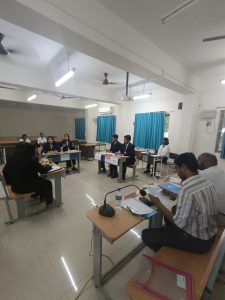
BrightLeaf’s second major argument focused on Clause 6.1 of the Master Franchise Agreement (MFA), which strictly prohibited CaféBliss from opening other stores in the designated region. They challenged the opposing party’s defense that the new outlets were “sub-brands” and not in violation of the exclusivity clause. Citing relevant case law, BrightLeaf contended that similar businesses operating under slightly different branding still fall within the same category and could mislead consumers, resulting in market confusion. They emphasized that even minor branding variations can impact the identity and profitability of the main business, especially when consumers perceive the new stores as part of the existing franchise.
The third issue raised pertained to Clause 6.4 and the application of Sections 52 and 54 of the Indian Contract Act. BrightLeaf contended that the order of performance for reciprocal promises was not followed, and that CaféBliss failed in its obligations. Therefore, BrightLeaf’s modification of the menu did not constitute a breach, as it was a reaction to the opposing party’s non-compliance. They invoked Section 73 to justify their conduct, asserting that they took necessary steps to mitigate losses caused by the breach. Furthermore, they pointed out the lack of any credible evidence from CaféBliss to prove that they were under any impossibility to perform their obligations, thus discrediting the claim of force majeure.
Addressing the fourth issue, BrightLeaf reiterated that the unilateral increase in royalty and breach of Clause 6.1 were acts that caused them direct commercial damage, and therefore warranted both an injunction against CaféBliss from opening further stores and monetary compensation. On the other hand, CaféBliss defended their position by arguing that the royalty hike was essential for the business’s sustainability during the pandemic and not aimed at profit-making. They argued that BrightLeaf had the option to withhold payment at the time instead of seeking reimbursement later. Regarding the exclusivity clause, CaféBliss maintained that Clause 6.1 restricted only the main brand and not sub-brands, which operated with different menus, ingredients, and customer segments. Lastly, CaféBliss alleged that BrightLeaf had not approached the arbitration with clean hands. The judges noted that the arbitrators’ questioning appeared disproportionately directed at one party and cautioned that any analogies made during the arguments must be directly related to the issues at hand for better clarity and fairness.
Court Hall-V
Med-
The mediation session commenced with a warm and welcoming introduction by the mediators. They began by explaining the mediation process, ensuring that the parties felt safe and reassured about the confidentiality of the discussions. Emphasizing neutrality and their role as facilitators, the mediators also shared brief introductions in their personal capacities, underscoring their commitment to guiding the parties toward a meaningful resolution. Following this, both parties introduced themselves. To set a collaborative tone, MA-17 employed a metaphor involving a guitar and a tuna fish, illustrating that just as both hands must coordinate to produce harmonious music, both parties in mediation must cooperate and align their efforts to achieve a mutually beneficial outcome. The concept of a caucus session was also introduced, highlighting its potential to offer a private and secure space for more open and candid conversations.
The requesting party began by expressing the value of their trust and commitment to the franchise. They emphasized that they had never abandoned their contractual obligations and entered mediation not to accuse or exacerbate breaches but to rebuild their relationship with CaféBliss. However, they highlighted their financial recovery struggles post-pandemic and asserted that CaféBliss had violated the contract by opening a new outlet in a restricted region, which constituted a breach of the exclusivity clause.
On the other hand, the respondents urged the parties to focus on real, pragmatic solutions to preserve their long-term partnership. Regarding Issue 1—royalty adjustment—they downplayed its urgency as a reason to initiate mediation. Concerning Issue 3—the introduction and modification of local substitutes—they addressed allegations of breach under Clause 6.1 of the agreement.
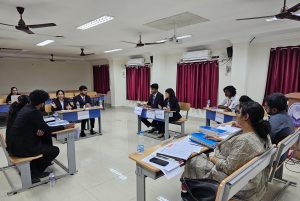
The mediators intervened at intervals to assure the parties that their grievances were acknowledged and provided a brief summary of their respective arguments. Based on the deliberations, the mediators identified three key agendas for discussion: (1) the royalty fee structure, (2) the opening of CaféBliss outlets in Northern Litoria, and (3) delays in the supply of raw materials. The requesting party expressed that they did not object to the royalty fee per se but requested a 2% refund of the excess already paid. They proposed a restructured payment plan, suggesting a gradual increase in royalty starting with a lower percentage and returning to the original 12% only after market stabilization. They also sought the formation of a joint board to deliberate on significant matters, especially those concerning marketing, and expressed interest in having at least partial control in decision-making processes.
The respondents, in response, requested a caucus session specifically to discuss Issue 2. During the caucus, CaféBliss clarified that the franchise should function under their flagship and expressed willingness to include the 2% refund within the 12% royalty framework. The requesting party, in their private session, reiterated their financial difficulties and raised concerns about control over other CaféBliss Lite outlets. They either wanted the royalty to gradually increase or to be granted partial control over the Lite cafés.
The mediators concluded the session by encouraging both parties to maintain open channels of communication and summarizing the main positions presented. BrightLeaf reaffirmed its desire for a restructured payment model and the formation of a joint decision-making board, particularly for marketing-related decisions. Importantly, both parties consented to disclose the issues discussed in the caucus sessions, reflecting a commitment to transparency. The session ended on a hopeful and positive note, with both parties delivering pleasant closing statements and agreeing to continue the discussions in subsequent sessions with more clarity and intention.
Arb-
The arbitration session commenced with a formal introduction to the arbitration process by the arbitrators. The session was structured and respectful, with both parties given a fair opportunity to present their submissions and respond. The requesting party began by presenting their case, addressing Issues 1 and 2 through their lead counsel, and Issues 3 and 4 through co-counsel.
On Issue 1, the requesting party submitted that there was a unilateral increase in the royalty fee, in direct contravention of the contractual provision which required mutual consent and documentation. They relied on multiple legal authorities to bolster their argument, including a Supreme Court judgment emphasizing the necessity of consensus ad idem for the formation and modification of contracts. Section 62 of the Indian Contract Act (ICA) was cited to argue that modification requires mutual agreement, while Section 37 was invoked to establish the continued obligation of parties to perform or offer to perform their promises.
They also argued that Café Bliss, by unilaterally modifying the fee structure, had abused its dominant position, drawing analogies from Section 4 of the Competition Act and referencing the SpiceJet v. KL Airways case. Under Section 17 of the ICA, the principle of fairness in contracts was highlighted, with the requesting party asserting violations of Sections 10, 37, and 62 of the ICA. They sought restitution and appropriate reliefs from the Tribunal. Supporting their claim, they referred to Annexure 2, which showed that the respondents had communicated the fee increase without prior discussion, and Annexure 3, which clearly showed Brightleaf’s opposition to such unilateral changes.
On Issue 2, the requesting party argued that the opening of Café Bliss Lite outlets constituted a breach of the Master Franchise Agreement (MFA), particularly Clause 6.1, which provided territorial exclusivity. They contended that consumers did not distinguish between Café Bliss and Café Bliss Lite, as both shared the root brand name. They cited the case of Gujarat Bottling Co. Ltd. v. Coca-Cola Co., which established that sub-branding cannot override contractual territorial exclusivity, and adding suffixes like “Lite” did not make the brand distinct. The doctrine of fair dealing was invoked to argue that sub-branding cannot be used as a shield to violate exclusivity clauses.
Issue 3 was addressed by co-counsel, who submitted that there was no breach of the agreement when Brightleaf temporarily procured local substitutes due to the respondent’s supply delays. They referred to Clause 5.2 of the MFA and asserted that Café Bliss failed on both contractual and legal grounds. Annexure 8 contained internal communication that demonstrated the supply chain breakdown. The requesting party invoked Section 54 of the ICA, and various judgments, to argue that their actions were commercially reasonable and legally excused. The principles of good faith, fair dealing, and mitigation under Section 73 of the ICA were stressed. It was contended that Brightleaf took steps to preserve the brand’s goodwill and substituted only customary materials, which did not deviate from the brand’s standards. Relevant cases such as Pushkaran S. Maheshwari v. Kulgachia Calamari and Ravi Sant v. D.M. Exports were cited.
On Issue 4, Brightleaf claimed compensation for losses due to the unilateral royalty increase and the breach of the exclusivity clause. They referred to Clause 4.3 of the MFA and reiterated that Café Bliss’s actions amounted to a direct violation. They cited Gujarat Bottling again, and also relied on the Delhi High Court decision in Ministry of Defence v. Zentex, which upheld compensation for contractual breaches. The requesting party closed with a formal prayer, asking the Tribunal to grant reliefs it deemed just and fit.
The respondent then presented their submissions, beginning with Issue 1. They defended the royalty fee adjustment as a response to the extraordinary circumstances brought on by the pandemic. Relying on the force majeure clause, and Sections 32, 36, and 56 of the Litoria Contract Act (LCA), they argued that COVID-19 was an unforeseen event warranting adaptive contractual measures. The case of R. Narayan v. Government of TN & Ors. was cited to support their claim. They also invoked Section 62 of the LCA and argued that Brightleaf’s continued payment of the revised royalty amounted to passive acceptance and thus barred claims for compensation under the doctrine of acquiescence.
On Issue 2, the respondents contended that Café Bliss Lite was not covered under Clause 6.1 of the MFA. They argued for a strict interpretation of the clause, invoking the principle expressio unius est exclusio alterius. They relied on Annexure 5 to assert that Café Bliss Lite was a distinct brand with a unique menu, catering to a different market segment. They also invoked Article 19(1)(g) of the Constitution of Litoria, arguing that the clause could amount to an unlawful restraint of trade.
For Issue 3, the respondents maintained that Brightleaf’s procurement of substitutes was in violation of Clause 6.4 of the MFA and that such actions harmed the brand’s identity and consumer trust. While they admitted to delays in supply, they attributed these to unforeseen third-party issues and asserted that Brightleaf should have communicated their necessity for substitution.
Regarding Issue 4, the respondents argued that no compensation was due as there was no breach on their part. They relied on the continued operation of the outlets and consistent royalty payments by Brightleaf to show implied acceptance of the new terms. Rebuttals were presented by the requesting party, asserting that force majeure clauses only justify non-performance, not unilateral changes. They also dismissed the claim of passive acceptance, pointing to Annexure 3, which showed timely opposition. The respondents offered sur-rebuttals, maintaining that Brightleaf’s continued payments amounted to passive acceptance of the new terms.
Throughout the session, the arbitrators posed questions to both sides, seeking clarification on key factual and legal points. These questions helped the parties better understand each other’s positions and refine their arguments. The session ended with closing prayers from both parties and an expression of hope that the Tribunal would adjudicate the matter with fairness and balance.
Court Hall-VI
Med-
The mediation session commenced with the mediators introducing the benefits of the mediation process and creating a comfortable environment for all participants. They clarified their role as neutral facilitators, not decision-makers, emphasizing that their opinions were non-binding. Additionally, the mediators stressed the importance of maintaining confidentiality and outlined the procedure, including the use of caucus sessions and the setting of a structured agenda to guide the discussion.
The requesting party was then invited to present their opening statement. They expressed deep concern over the decline in profits following the COVID-19 pandemic and attributed their financial distress to violations of Clauses 4.1, 4.3, and 5.2 of the Master Franchise Agreement. Their counsel, appearing in an advisory role, highlighted the reputational damage suffered due to these breaches. The requesting party proposed two primary agenda items for discussion: the breach of exclusivity and issues surrounding royalty payments.
Following this, the opposing party and their counsel presented their opening statement. They raised concerns regarding unauthorized amendments to the agreement, citing erosion of consumer trust and lack of prior communication as major grievances. They also objected to the increase in royalty fees from 10% to 12%, arguing that such changes were implemented without consultation or consent.
The discussion began with the requesting party asserting that the royalty increase and failure to supply the agreed quantities of coffee beans had caused substantial financial losses. They proposed a rollback of the increased royalty rate and demanded compensation for the losses incurred. It was stressed that any contractual amendment required mutual agreement, and no such consent had been provided. The opposing party defended the royalty hike, citing commercial necessity and stating that the change had been communicated via email. The requesting party countered this argument by asserting that mere communication does not equate to contractual consent.
The requesting party then called for a caucus session. In this private meeting, they reaffirmed the confidential nature of the discussion and demanded compensation amounting to 60–70% of the losses suffered. They emphasized that their shareholders supported this stance and that they would not accept any offer falling below this threshold.
In a subsequent caucus session with the opposing party, a proposal was made to introduce an adjustment period of four to ten months to ease the royalty payment burden on the requesting party. However, they firmly declined to offer any monetary compensation, citing that the funds had already been reinvested. They further referred to a Most Favoured Nation (MFN) clause, which they argued restricted them from providing compensation without triggering significant penalties.
The requesting party rejected the proposed adjustment period and moved forward to the second agenda item regarding exclusivity and potential brand conflicts. They raised concerns over the operation of a chain of stores under the name “Café Bliss” or similar within their contractual territory. These stores were allegedly engaged in a similar line of business, thereby violating the exclusivity provision in the agreement. They demanded that such operations be ceased within their designated region. In response, the opposing party maintained that the other outlets operated under a different brand identity, offered a distinct menu, and targeted a separate consumer base. Therefore, they denied any breach of exclusivity or direct competition.
The session concluded without the parties reaching a final agreement on either of the agenda items. While significant concerns were raised and discussed, the lack of consensus meant that further deliberation or subsequent mediation sessions may be necessary.
Arb-
As the requesting party was absent from the session, the proceedings continued ex parte. The respondent, representing the opposing party, advanced their submissions and leveled several allegations against the requesting party. Chief among these were claims that the requesting party had breached specific provisions of the governing Master Franchise Agreement (MFA).
The agenda for the session focused on two key issues: first, the examination of the exclusivity clause and whether it had been violated; and second, the validity of the unilateral increase in royalty rates within the context of the MFA.
Addressing the issue of the royalty rate increase, the respondent argued that the adjustment was lawful under the terms of the Most Favoured Licensee (MFL) agreement. They contended that the agreement, being commercial in nature, allowed for adjustments that were commercially reasonable. Invoking the doctrine of commercial reasonableness, the respondent maintained that the change in royalty rates was necessitated by prevailing market conditions and did not constitute a contractual breach.
In response to the arbitrator’s query regarding the initiation of any formal dispute resolution mechanisms prior to the implementation of the new royalty structure, the respondent referred to a landmark judgment that held that unforeseen hardship can justify reasonable and necessary modifications in commercial agreements. Furthermore, they invoked the doctrine of necessity, arguing that the revision of the royalty rates was critical in light of business exigencies and external economic pressures.
The discussion then turned to branding and exclusivity. A detailed analysis of the relevant clauses in the MFA was undertaken, focusing on whether the respondent’s branding strategy violated the exclusivity provisions. The respondent advanced the doctrine of differentiated branding, asserting that the allegedly competing brand was in fact a subset of the primary brand and did not amount to direct competition. They claimed that the two entities served distinctly different consumer bases, and hence, no breach of exclusivity had occurred.
To substantiate their position, the respondent cited several case laws and argued that the concept of exclusivity must be interpreted in light of evolving market strategies. According to them, what appeared to be competition was actually a form of brand innovation designed to keep pace with consumer trends and expectations. A detailed exchange followed regarding the interpretation and application of the exclusivity clause, with the respondent maintaining that their approach was commercially and contractually sound.
5:00 PM |Arbitral Award Writing | Library’s Language Lab
Following the successful conclusion of the Qualifier Rounds, participants assuming the role of Arbitrators were escorted to the Language Lab for the Arbitral Award Writing. As per the guidelines stipulated by the Arbitration and Conciliation Act, 1996 (Act), arbitrators are mandated to draft an award after each arbitration session. This task is assigned to participants registered as mediators/arbitrators following the oral submissions presented by both parties during the Arbitration Rounds.
6:30 PM |SCC Training Session | UG Block
Mr. Anish Mishra, Student Ambassador of Eastern Book Company (EBC), recently conducted an insightful session introducing participants to the legacy and advanced research tools offered by EBC. He began by providing a brief history of EBC, highlighting its longstanding contribution to legal publishing and its pivotal role in shaping legal research in India.
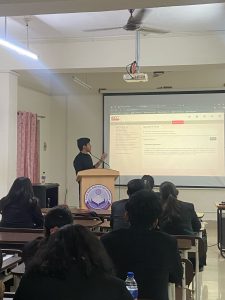
Mr. Mishra then delved into the functionalities of Supreme Court Cases (SCC) Online, EBC’s comprehensive legal research platform. He demonstrated how the “Words and Phrases” feature can be utilized for preliminary research, such as understanding the term “Arbitration Agreement” by accessing judicially defined interpretations. He further explained the “Find by Topic” feature, illustrating how users can efficiently locate resources on subjects like Mediation. The “Find Content by Section” tool was showcased by navigating through Central Acts, specifically the Indian Contract Act, to explore Section 37, which discusses the obligations of parties to contracts.
The session also covered the “Browse Curated Topics” feature, allowing users to explore comprehensive materials on specific legal themes. Mr. Mishra shared his personal experiences in moot court competitions, emphasizing how these tools have been instrumental in his research and preparation. He demonstrated the “Browse Article” function by exploring articles on Mediation and the “Browse Legislation” feature by examining the Arbitration Act. Using a practical example from a proposition involving a master franchise agreement, he illustrated the “Word Search” function and the “Search Within Search” option to filter results further, such as narrowing down information related to royalty clauses. The “Case Reference” feature was highlighted for its utility in tracing judicial precedents, and he explained how to create a compendium of cases using Boolean operators to refine search results.
Transitioning to the EBC Reader, Mr. Mishra explained its advanced features and how it complements SCC Online. The EBC Reader offers a vast eLibrary with over 1,100 titles, including books, bare acts, manuals, referencers, dictionaries, and law journals, accessible 24/7. Its advanced search capabilities allow users to locate information swiftly across various legal documents. Notably, the EBC Reader is cross-linked with SCC Online, enabling seamless access to related case law directly from the eBooks, thereby enhancing the depth and efficiency of legal research.
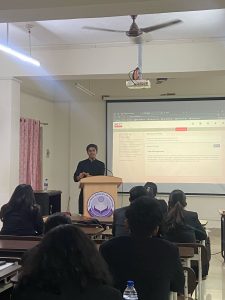
Mr. Mishra concluded the session by emphasizing the importance of leveraging these digital tools for effective legal research and preparation. He encouraged participants to explore the features of SCC Online and EBC Reader to enhance their legal acumen and stay abreast of developments in the legal field.
TEAMS QUALIFYING FOR THE SEMI-FINALS ARE-
Mediator-Arbitrators-
MA-02
MA-06
MA-13
MA-17
Negotiation Pairs-
TC-01
TC-03
TC-13
TC-17
20th April, 2025 (Day 2)-
10:30 AM | Semi-Final Rounds | UG Block
Court Hall-I
Med-
In Court Hall I, the mediation began with the mediators outlining their role, explaining confidentiality and neutrality, and inviting each party to introduce themselves. The Requesting Party (Brightlife’s CEO) raised concerns over an unapproved increase in royalty from 10 percent to 12 percent, pandemic‑related losses, and unauthorized outlet openings. The Responding Party acknowledged the operational rationale behind their decisions but emphasized their intention to preserve the partnership. Through open dialogue and with mediation techniques such as caucus explained for potential deadlocks, the parties explored solutions, including capping royalties at 11 percent, performance‑based structures, joint committees, and territorial protections. Concluding offers and counter‑offers were made, and the session closed with both sides committing to continued discussion toward an amicable resolution.
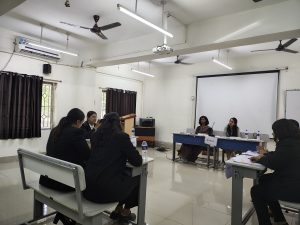
The mediators convened the parties in Court Hall I by first demystifying the mediation process: they explained that mediation is not about imposing solutions but about creating space for each side to understand the other’s perspective in a confidential and impartial setting. Each mediator introduced themselves and reaffirmed that they had no conflict of interest. Ground rules were set—respect, honesty, and openness, and the possibility of private caucuses was outlined in case of impasse. This initial framing helped both sides feel at ease, emphasizing that control of the outcome rested entirely with the parties, not the mediators.
Brightlife’s CEO began by detailing his longstanding relationship with the Master Franchise Agreement. He recounted how the pandemic had severely impacted the franchise’s performance, making the unilateral royalty increase from 10 percent to 12 percent particularly burdensome. He also objected to the Responding Party’s establishment of new outlets without prior consent, which he claimed diluted the brand and diverted revenue, leaving him without adequate operational support.
In response, counsel for the Responding Party clarified that her role was purely advisory; all decisions lay with her client. The Responding Party’s representative characterized the royalty adjustment and new outlets as strategic moves taken in good faith to sustain and expand the business under challenging conditions, with no intent to damage the partnership.
The Requesting Party asserted that the unilateral amendments amounted to a breach of the Master Franchise Agreement, particularly the clauses governing exclusivity and royalty negotiations. He noted that, although he had received an email proposing the increase, it did not invite genuine discussion or address his concerns, so he had formally rejected it and requested further dialogue.
The Responding Party countered that the email had been intended as an engagement tool rather than an imposition. They argued that increased operational costs justified the revised royalty rate and that new outlets targeted different customer demographics, thereby promising mutual benefit rather than conflict.
When the mediator invited potential solutions, the Requesting Party proposed reimbursement for past overpayments and amendments to the agreement to prevent similar unilateral actions. He also suggested establishing a joint committee to develop a performance‑based royalty structure, ensuring future adjustments would depend on clear, agreed-upon metrics.
The Responding Party offered a counter‑proposal to cap the royalty rate at 11 percent—midway between the original and current rates—and further committed to opening six additional outlets, with planning subject to joint approval. They also expressed willingness to discuss the duration of the capped rate and to reinvest any reimbursement into new outlet development.
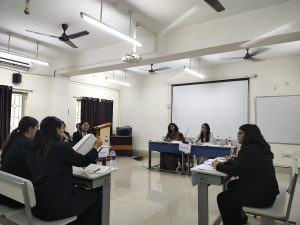
The Requesting Party raised further issues about brand confusion and market saturation, reporting that customers had encountered identical menus at the new outlets but at lower prices, eroding his franchise’s profitability. He requested written assurances that no additional outlets would operate within his territory. The Responding Party responded by highlighting the distinct market demographics they served and insisted that dual-brand promotion could be mutually advantageous. When asked about compensating customers (for example, free drinks offered to attract footfall), the Responding Party explained these marketing tactics as efforts to stimulate demand for both brands rather than favor one over the other.
Both sides delivered succinct closing statements: the Requesting Party reiterated its need for contractual safeguards and fair compensation, while the Responding Party stressed its commitment to collaborative growth and practical compromise. The mediators thanked the parties for their respectful engagement and reminded them that the mediation was an ongoing process, encouraging continued dialogue toward a final settlement.
Arb-
The Claimant opened by reminding the Tribunal that the Master Franchise Agreement was executed by both parties in 2020, emphasizing that its express “mutual consent” clause precludes any amendment absent the written agreement of both sides. He explained that his co‑counsel would address later issues, while he would focus on the unilateral increase in royalty and the unauthorized opening of new outlets. Invoking Section 37 of the Indian Contract Act, he underscored that free consent is the bedrock of contractual validity and that any change to the clearly defined terms of the MFA must be documented in writing.
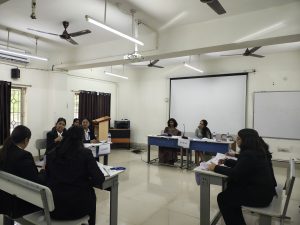
Turning to the first contested issue, the Claimant detailed how the Respondent raised the royalty rate from 10 percent to 12 percent without genuine negotiation. Although his client promptly communicated their rejection of the proposal, no substantive response was received, demonstrating that consent could not be implied by silence. This unilateral hike, he argued, imposed a fresh financial burden and disrupted the commercial balance both parties had painstakingly established. To illustrate that such one‑sided adjustments offend contractual fairness, he cited established precedent holding that terms imposed without fair notice or agreement are void.
On the second issue, the Claimant submitted that Clause 6.1 of the MFA guarantees his franchise’s sole territorial rights, yet the Respondent proceeded to open two new outlets with an almost identical trade dress and menu at lower prices. He contended that these actions breached the exclusivity covenant, siphoning off customers and eroding his client’s market share. Drawing on cases where courts have struck down overlapping franchise units, he insisted that even absent explicit “sub‑brand” language, the agreement’s plain promise of exclusivity must be honored in both spirit and practice.
The Claimant further emphasized that the Respondent’s repeated failure to provide operational support violated Clause 4.3 and warranted application of the doctrine of estoppel. Despite numerous requests for timely deliveries and training over the past three months, the Respondent defaulted on its support obligations, causing additional losses. Invoking Section 56 of the Contract Act, he pressed for strict compliance with all contractual duties, arguing that the Respondent cannot now claim ignorance after having repeatedly neglected its own promises.
In his closing remarks, the Claimant prayed that the Tribunal declare the 12 percent royalty increase void and order restitution for any overpayments, reinstate the 10 percent rate, enjoin the Respondent from opening further outlets within the franchise territory, compel full compliance with support obligations, and direct the formation of a joint committee to negotiate any future fee adjustments on a performance‑based metric.
The Respondent began by stressing the unprecedented financial strain caused by the COVID‑19 pandemic and ensuing lockdowns, which necessitated the royalty adjustment to keep franchise units afloat. Introducing financial analyses, they demonstrated that without the increase, several outlets would have shut down permanently. They pointed to the continued payment of royalties by the Claimant, without timely objection until January 10, as evidence of tacit acceptance, invoking estoppel and Sections 8 and 9 of the Contract Act. The Respondent argued that the amended rate was neither arbitrary nor oppressive but essential for business survival, supported by doctrines of business efficacy and good faith.
Addressing the exclusivity dispute, the Respondent explained that the new “CaféBliss Lite” outlets serve a distinct demographic with a differentiated menu and pricing structure, thus falling outside the MFA’s scope. They urged the Tribunal to apply the mischief rule and refrain from reading prohibitions into a contract that the parties did not expressly include, noting that had the drafters intended to restrict sub‑brands, they would have said so. Citing cases on franchisor quality control, they emphasized that they diligently fulfilled all support obligations, providing evidence of timely deliveries, marketing assistance, and staff training.
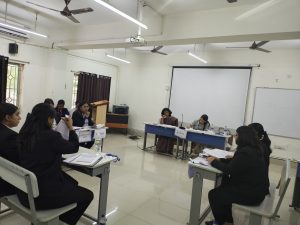
With both sides having presented their closing arguments, the Tribunal must now weigh the sanctity of the MFA’s express terms against the Respondent’s commercial necessity in the face of a global crisis. The parties stand ready to abide by an equitable resolution, whether that means reinstating the original terms with built‑in safeguards or recognizing the Respondent’s pragmatic adjustments as valid under the extraordinary circumstances.


